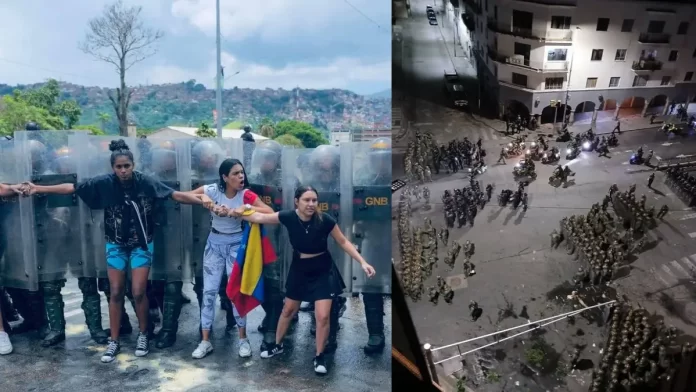The European Union’s top diplomat, Josep Borrell, criticized Venezuelan President Nicolás Maduro on Saturday for failing to provide “necessary public evidence” to prove his victory in July’s elections. This statement comes days after Venezuela’s Supreme Court upheld the government’s disputed claims of victory.
The EU has aligned with several Latin American countries and the United States in rejecting the Venezuelan high court’s certification of the election results. Authorities have reiterated their calls for Maduro to release the official tally sheets, which are considered the only verifiable vote count in Venezuela due to their near-impossible replication.
“Only complete and independently verifiable results will be accepted and recognized,” Borrell emphasized in his statement.
Borrell’s remarks coincided with demands from Brazilian President Luiz Inácio Lula da Silva and Colombian President Gustavo Petro, who both urged for the release of the tallies, asserting that the “credibility of the electoral process can only be restored through the transparent publication of disaggregated and verifiable data.”
While the joint statement from Lula and Petro acknowledged the court’s ruling, it stopped short of rejecting the certification. Their cautious response was closely watched, given their political ties to Maduro and their roles in facilitating talks between the Venezuelan government and the opposition.
Maduro has claimed victory in the presidential election but has refused to release the official tallies. Meanwhile, the main opposition coalition has accused him of attempting to steal the vote. Opposition volunteers have collected copies of voting tallies from 80% of the country’s 30,000 polling stations, showing that opposition candidate Edmundo González won by a margin of more than 2-to-1. However, the Supreme Court and other government entities have dismissed these tallies as forged.
In response to Borrell’s comments, the Venezuelan government denounced his statements as “interventionist.” The Foreign Ministry warned that continued disrespect from the EU toward Venezuela’s sovereignty could “considerably affect diplomatic, political, and economic relations.”
Lula and Petro, while acknowledging the court’s decision, emphasized their expectation for the release of the official tallies. They also called on all parties in Venezuela to refrain from violence and repression, following the arrest of over 2,000 people amid nationwide protests against the election results. Although the two leaders did not directly blame the Maduro government for the violence, their caution reflects growing concerns over the political situation in Venezuela.
As tensions rise, key opposition figure Maria Corina Machado has gone into hiding, and the government has ordered González to provide sworn testimony in an ongoing investigation, accusing him of spreading panic by contesting the election results.
Critics have previously accused Lula and Petro of leniency toward Maduro’s government, but their tone has become increasingly stern in recent months, especially in light of the election controversy. Both leaders reiterated their commitment to facilitating dialogue between the Venezuelan government and the opposition, stressing that “the political normalization of Venezuela requires the recognition that there is no lasting alternative to peaceful dialogue and democratic coexistence.”
Key Points:
- EU Criticism: EU diplomat Josep Borrell criticized Venezuelan President Nicolás Maduro for not providing sufficient evidence to substantiate his victory in the July elections.
- International Rejection: The EU, along with several Latin American countries and the United States, has rejected the Venezuelan Supreme Court’s certification of the election results.
- Call for Transparency: Authorities and international leaders are demanding the release of the official election tally sheets, considered the only verifiable vote count in Venezuela.
- Brazilian and Colombian Leaders’ Response: Brazilian President Luiz Inácio Lula da Silva and Colombian President Gustavo Petro called for the publication of disaggregated and verifiable data to restore the election’s credibility. They acknowledged the court’s ruling but did not reject it outright.
- Opposition Claims: Opposition groups have collected evidence suggesting that opposition candidate Edmundo González won by a significant margin, although the Venezuelan government disputes these claims.
- Government Response: The Venezuelan government dismissed Borrell’s comments as “interventionist” and warned of potential diplomatic and economic repercussions.
- Ongoing Violence: Over 2,000 people have been arrested amid protests against the election results, with leaders urging for an end to violence.
- Political Developments: Key opposition figure Maria Corina Machado is in hiding, and the government is investigating González for allegedly spreading panic about the election results.
- Dialogue and Normalization: Lula and Petro emphasized their willingness to facilitate dialogue between the Venezuelan government and opposition, advocating for peaceful and democratic solutions to the crisis.



